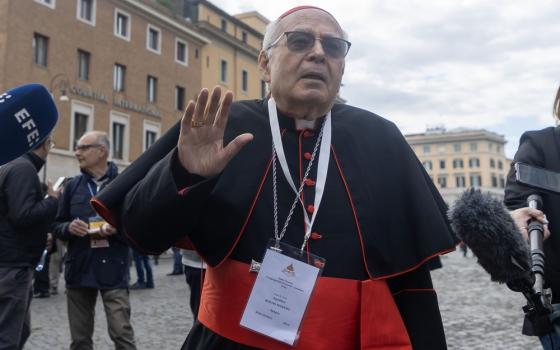I've always had a problem with the idea that Jesus had to die so terribly in order to make satisfaction for the sins of humanity. And it gets my attention every Holy Week, when we concentrate for six days on Jesus' passion and death and the horrors of his crucifixion.
Back in the 11th century, St. Anselm posed the theory that God was infinitely offended by humanity's sins and the matter could only be set right by the sacrifice of one who was equal in dignity to God. Since Jesus was the son of God and equal to the Father, he could and did freely lay down his life and thereby atone for our sins for all time. That's pretty much it, as it was explained to us in the seminary by a Jesuit priest. And we all sat there nodding numbly, thinking, "Yup, if you say so."
Only years later did I realize there are so many things wrong with the Anselm theory. First, it's so neat and tidy and abstract, like something your lawyer would draw up. Second, it makes the God of Christianity a kind of angry pagan god who demands satisfaction from those who offend him. Third, it makes Jesus the willing victim of this raging deity. The torments of his crucifixion demonstrate just how outraged God was and how necessary was Jesus' pain and agony for our salvation.
The cross is usually the first thing you see when you enter a Catholic church. In some places, it's a kind of art piece that does not offend but may confuse; in others, it's more true to life: The suffering is palpable, and the visitor may be a bit disturbed. Gradually, we all get used to the cross and numbed by the crucifix. They are on the wall in our homes, in our Catholic schools and universities, hanging around the necks of our bishops and dangling from the rosaries worn by nuns in the old days. Still, one of the most honored devotions is the Stations of the Cross, wherein we walk with Jesus to his awful, bloody death. On Good Friday, we process in church in order to kiss a cross or crucifix held by altar servers. The cross is unquestionably our symbol, our sign, our banner and flag. We have been saved by the cross!
Or have we? I prefer to think we are saved by Jesus, by the coming of the Second Person of the Trinity into our world to announce God's love and forgiveness. We are saved by his birth, by what he did and said in his public life, and yes, by his passion, death and resurrection. It's all of one piece: the Son of God in our midst. But I do not see much about this approach in the liturgy or in ordinary homilies.
I do not believe God the Father wanted and planned the crucifixion. I can't explain it, but I'd like to suggest Jesus' death was the result of his entry into our flawed world where random occurrences of great significance occur with tragic regularity. Yes, this is the world God gave us, and Jesus chose to embrace it even in all its randomness. To obsess over his sacrifice, suffering and death, I think, is to distort the essential message -- that we are God's beloved,
Emily Reimer-Barry, assistant professor of theology at the University of San Diego, gets at this in the May issue of U.S. Catholic when she considers how an overemphasis on sacrifice has affected Catholic women: "Giving of ourselves is, of course, important. But in a gift exchange, there should be some mutuality." Women too often accept exhaustion, second-class status, even physical and sexual abuse because that's the cross they must carry, she says. "But Jesus death on the cross is still tragedy. It is still murder. It is still something that should not be glorified in and of itself. Jesus suffered and was brutally murdered, but that does not mean that in order for Christians -- especially women -- to follow Jesus, they need to accept abuse in intimate relationships ... If we could see Jesus' death on the cross as connected to his life before his crucifixion and the messages of his ministry, then that's a good place to start."
I think that's a good place to start for all who tend to focus so narrowly on suffering and death that they've lost sight of Christianity as essentially a faith of joy, hope, song and thunderous alleluias.






